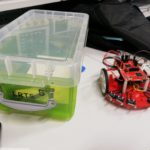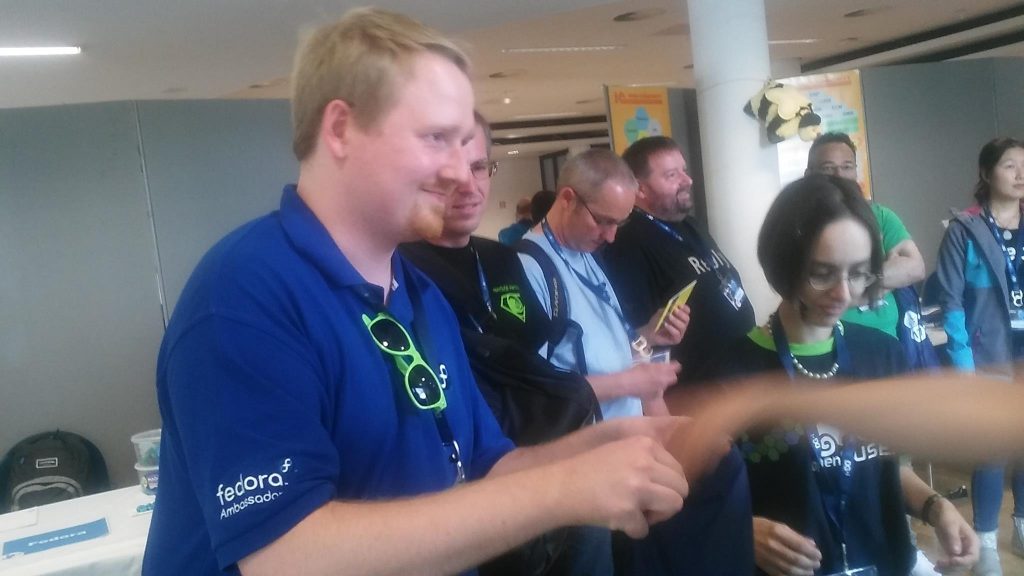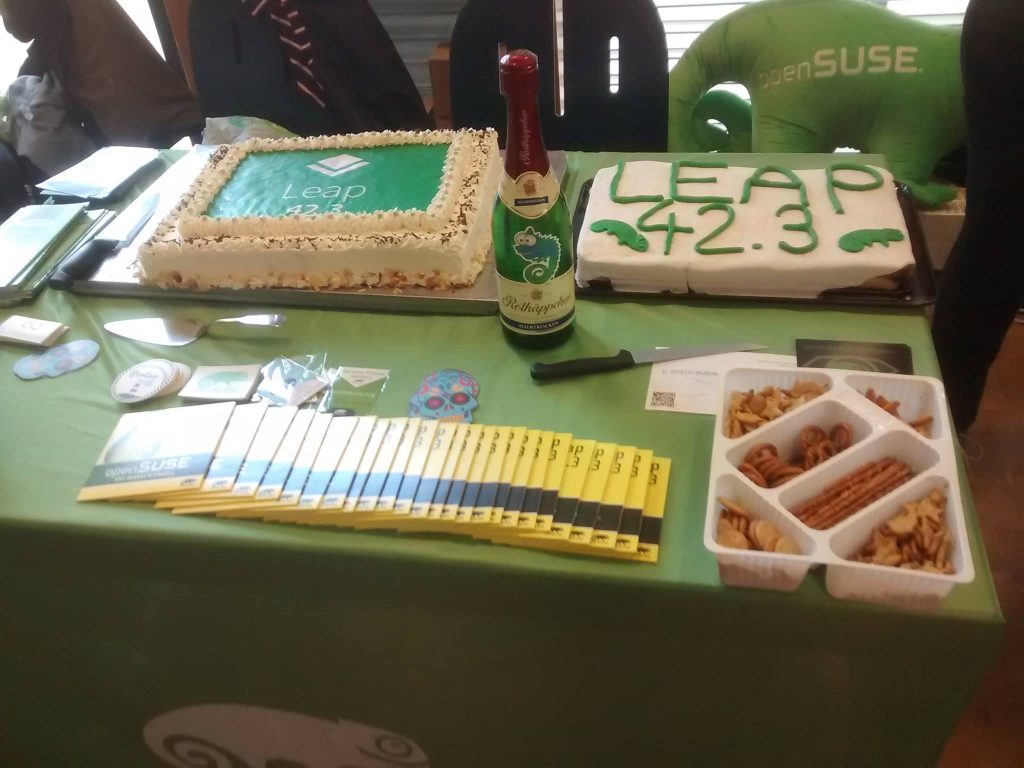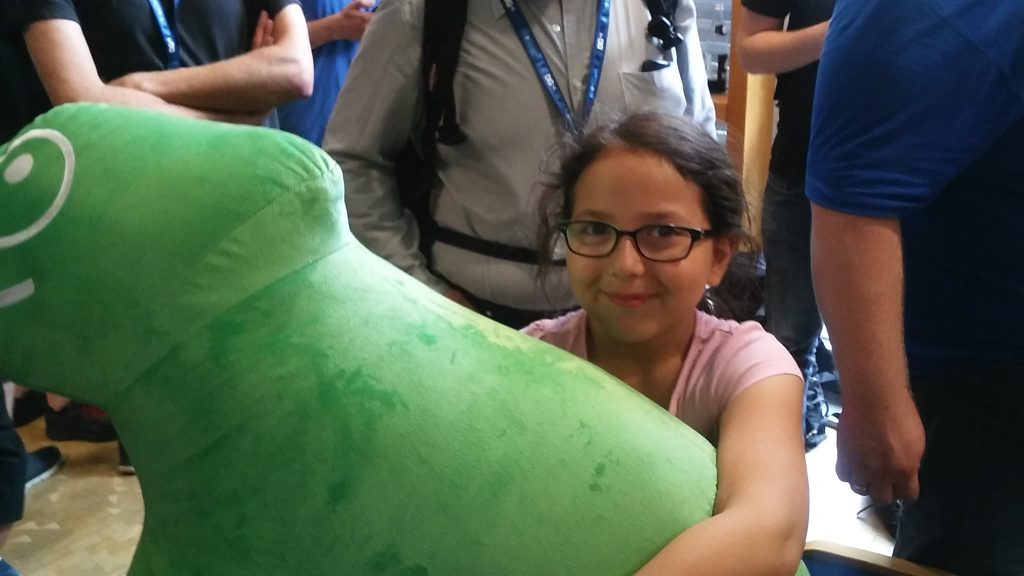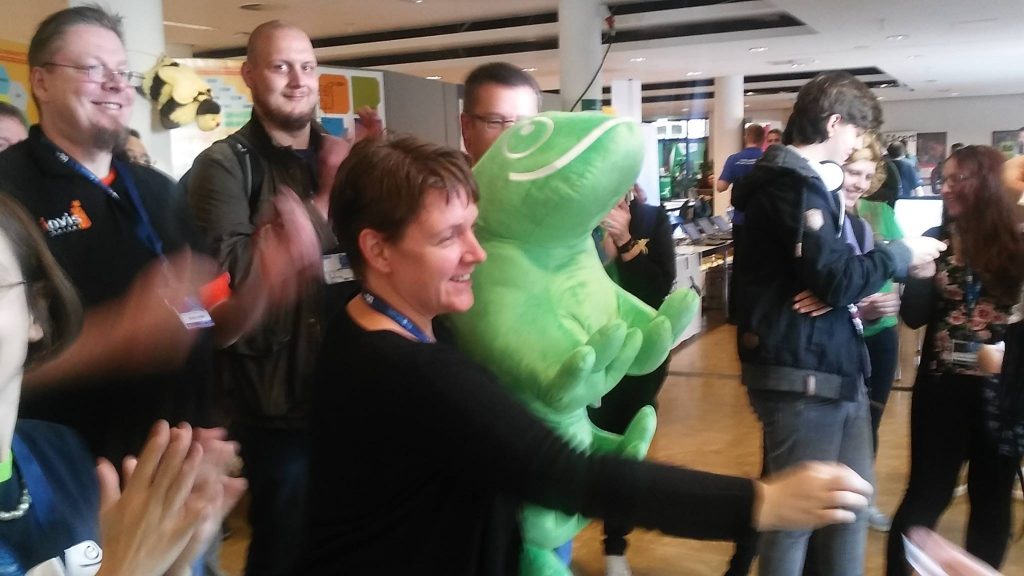This series of articles about Study Abroad is written in German, because Study Abroad Semesters should be planned early and Students with work experience (without Abitur) have to earn those relevant qualifications for abroad during their studies. These articles should be trackable for all interested Computer Science Experts with work experience.
Schon während meiner Ausbildung zur Fachinformatikerin – Systemintegration hatte ich den Wunsch zu studieren, und am Besten noch ein Auslandssemester zu integrieren. In der Firma wurde ich eher ausgelacht, weil ich nur den Realschulabschluß hatte. Allerdings hatten wir von der Berufsschule aus einen Studieninformationstag an der FAU dabei, weil wir mit 3 Jahren Berufserfahrung studieren durften. Am letzten Berufsschultag setzte sich also eine Gruppe an Fachinformatiker-Absolventen zusammen und plante das Studium mit 3 Jahren Berufserfahrung an der Ohm-Hochschule (jetzt TH Nürnberg).
Während meiner Berufserfahrung als Linux-Systemadministratorin habe ich jedes Jahr ein bisschen Geld für das Auslandssemester zurückgelegt. Mit 4 Jahren Berufserfahrung hatte ich genug zusammen und bewarb mich erfolgreich an der TH Nürnberg für Informatik. Außerdem erhielt ich die Zusage für das Aufstiegsstipendium. Schon am ersten Tag informierte ich mich über Hochschulpartnerschaften und Möglichkeiten ins Ausland zu gehen. Genauso waren die Anforderungen wichtig.
Anforderungen an Beruflich Qualifizierte für ein Auslandssemester:
1. ) Komplett bestandenes Grundlagenstudium (1. und 2. Semester)
2. ) Englisch-Zertifikat min. B2 (DAAD-Sprachnachweis, TOEFL, IELTS)
3. ) Noten entsprechend dem NC der jeweiligen Hochschule
4.) Motivation Letter
Über unser Language Center ist es möglich in Englisch bis zum C1-Level zu belegen und sich so neben dem normalen Studium auf die Sprachzertifikate vorzubereiten. Den DAAD-Sprachnachweis gibt es bei uns umsonst, wenn man Gründe – wie einen Auslandsaufenthalt – mit angibt. In der mündlichen Prüfung war die Prüferin über den Grund „fehlendes Abitur“ etwas erstaunt, weil sie so einen Fall noch nie hatte. Somit habe ich im 3. Semester einen Nachweis für Englisch C1 erworben.
Zuerst wollte ich mich für eine Partnerhochschule in Australien bewerben. Allerdings ging das nicht, weil wir nicht genug Austauschstudenten nach Deutschland bekommen. Dann entschloss ich mich als Freemover (selbst organisiert) ins Ausland zu gehen. Ich habe meine Professoren nach Empfehlungen (neben Oxford und Cambridge) gefragt und 2 Professoren haben mir Bristol empfohlen. Auch in den Hochschul-Rankings ist die University of Bristol sehr weit oben mit dabei. Außerdem hat sie Partnerhochschulen, wie die TUM, FAU und die Uni Heidelberg. Zusätzlich gehört sie zur Russell Group.
Um meine Chancen auf einen Studienplatz ohne Abitur zu erhöhen, bin ich auf einen Professor wegen einem Empfehlungsschreiben zugegangen. Da kamen nicht nur die bestandenen Fächer rein, sondern auch das ehrenamtliche Engagement in der Fachschaft, das Resultat der Gründung der AG Open Source, mein Workshop beim IN Vision Day und zum Schluß noch openSUSE. Damit war das fertige Empfehlungsschreiben 1,5 Seiten lang.
In Deutschland gibt es Organisationen, die Studenten bei den Bewerbungen als Freemover unterstützen. College Contact ist eine davon und hat die University of Bristol sogar in einer Liste an Partnerhochschulen dabei. Also habe ich meine Unterlagen dort eingereicht. Nach 2 Wochen kam die Zusage. 🙂
Als nächstes habe ich mich um die allgemeine Finanzierung gekümmert. Über das Aufstiegsstipendium hätte ich keine Übernahme der Studiengebühren gehabt, sondern nur 200€/Monat zusätzlich zum normalen Stipendium. Mit Beruflicher Qualifikation ist man aber auch noch elternunabhängig Bafög-berechtigt (solange Studienbeginn in Deutschland vor dem 30. Geburtstag). Das Auslands-Bafög übernimmt zusätzlich 4.600€ Studiengebühren (Stand: 2018) für 1 Semester oder ein ganzes Jahr und die Kosten für die Auslands-Krankenversicherung. Das muss auch nicht zurückgezahlt werden! Also setze ich jetzt für ein Semester das Stipendium aus und habe Bafög beantragt. In der Summe kostet das Studium in Großbritannien dann fast genauso wenig wie in Deutschland. Wer als Student die Kosten per Vorkasse nicht alleine tragen kann, kann einen KfW-Studienkredit, den Festo-Bildungsfonds oder den Bildungsfonds der Deutschen Bildung in Anspruch nehmen.
Als internationaler Student durfte ich mir 2 Studenten-Unterkünfte der Universität aussuchen, wo man dann eine garantierte Zusage erhält. Ich wohne jetzt im Waverley House, was zu Riverside (3 Studentenwohnheime nebeneinander) gehört. In unserer Flat sind wir 3 Deutsche Studenten, 2 Australierinnen und 1 Studentin aus Kanada. Eine der Australierinnen studiert hier Deutsche Geschichte. Eigentlich wollte ich ein bisschen internationaler wohnen. ^^
Die Welcome Week war mittelmäßig organisiert. Am ersten Tag gab es Einführungsveranstaltungen der Student Accommodations und vom International Office für uns. Das war gut organisiert. Man lernte alle neuen internationalen Studenten kennen. Eigentlich sollte man einen Stundenplan für die Welcome Week des entsprechenden Studiengangs erhalten, wo man sich für die meisten Fächer beworben hat. Statt Computer Science erhielten wir Informatiker aber Civil Engineering. Zur Besprechung unserer Wünsche wurden wir dann von einem Fach zum nächsten geschickt, bis sich eine Mechanik-Professorin um uns kümmerte und uns Ratschläge gab, weil wir von unserem Studiengang am Montag abend eine E-Mail erhielten, dass 60% unserer gewählten Fächer wegen Überfüllung internationalen Studenten nicht zur Verfügung stehen würden. An der School of Computer Science wollte man uns mit unseren Problemen nicht direkt an den Director for International Students weiterleiten, sondern wollte uns erst am Mittwoch wiedersehen. In der Zwischenzeit habe ich mich einem Master-Studenten angeschlossen, der die gleichen Fächer belegt hatte, die ich auch haben wollte (3. Jahr Bachelor) und ging auf die Einführungsveranstaltungen für Postgraduate Students. Am Mittwoch sollten wir unsere Alternativfächer abgeben, aber in der ausgelegten Liste gab es nichts, was wir zusätzlich nehmen konnten. Ich habe sofort einen Termin beim Director for International Students erhalten. Er war erstaunt, dass ich nicht schon am Dienstag zu ihm durfte. Er nahm meine Wünsche auf.
Der Postgraduate Student hatte den Professor für Embedded Systems als Program Director und somit eine Einführungsveranstaltung bei ihm. Ich bin anschließend für ein Gespräch auf ihn zugegangen und erhielt einen zusätzlichen Platz in seinem Fach. Machine Learning wurde für uns gestrichen. Als Alternativfach wurde mir dann Sustainability, Technology & Business vorgeschlagen, was auf der Homepage für dieses Semester nicht mit aufgelistet wurde. Nach langem Zögern habe ich zugesagt, als ich ein vergleichbares Fach auch an der TH Nürnberg in der FWPF-Liste sah. Ein weiteres Fach, wo ich eine Zusage erhielt, ist Introduction to High Performance Computing.
Die Uni hat viele grüne Landschaften und Gärten außen rum. Dort verbringe ich viele Mittagspausen. 
Die Kurse sind internationaler als gedacht. Ich habe mehr Chinesen als Engländer kennengelernt. Dafür ist das Studium praxisorientierter als an der TH Nürnberg. Jedes Fach hat hier Unterricht in Laboren und 2 meiner Fächer basieren nur auf praktischen Leistungen. Nach 3 Wochen musste ich in Embedded Systems & Real Time Systems ein Quiz abgeben, das zu 30% in die Endnote mit einfließt. Nächste Woche muss ich Code-Optimierungen für HPC abgeben. Die Labore sind super ausgestattet. Dafür sind sie auch fast den ganzen Tag mit Studenten gefüllt (inkl. Mittagspausen).
Genauso werden Gastdozenten eingeladen. In HPC hatten wir Unterricht von einem Principal Software Engineer von Intel und wurden zu einem IBM Meetup eingeladen. In Sustainability haben wir zusätzlichen Unterricht vom Sustainability Manager der Universität, der die Forschungsarbeiten vorstellt. Unser Professor hat früher als Führungskraft für die HP Labs gearbeitet. Unser Embedded-Professor kam mit Praxis bei ARM an die Uni und pflegt dort die Kontakte.
Jede Woche organisiert die Computer Science Society Vorträge für die Studenten. Das Mittagessen mit Pizza wird gesponsort. Mal gibt es Arduino-Workshops, mal git oder „Wie bewibt man sich erfolgreich im Silicon Valley“. Einige Sachen sind richtig interessant und es macht Sinn zu diesen Veranstaltungen zu gehen.
Um Kontakt zu Engländern zu bekommen, bin ich 3 Societies beigetreten. „Women in Engineering“ engagiert sich für mehr Frauen in technischen Fächern und gibt – wie die AG Open Source – Wissen weiter. Die „Computer Science Society“ ist ähnlich aufgebaut wie unsere Fachschaft Informatik und organisiert die oben genannten Veranstaltungen. Zum Schluß bin ich noch bei der „University of Bristol Expedition Society“. Diese Society geht klettern. Anfänger gehen zuerst in Bristol bouldern und anschließend macht man Ausflüge ins Gebirge von England. Es macht Spaß und langweilen tut man sich hier nicht. 🙂

